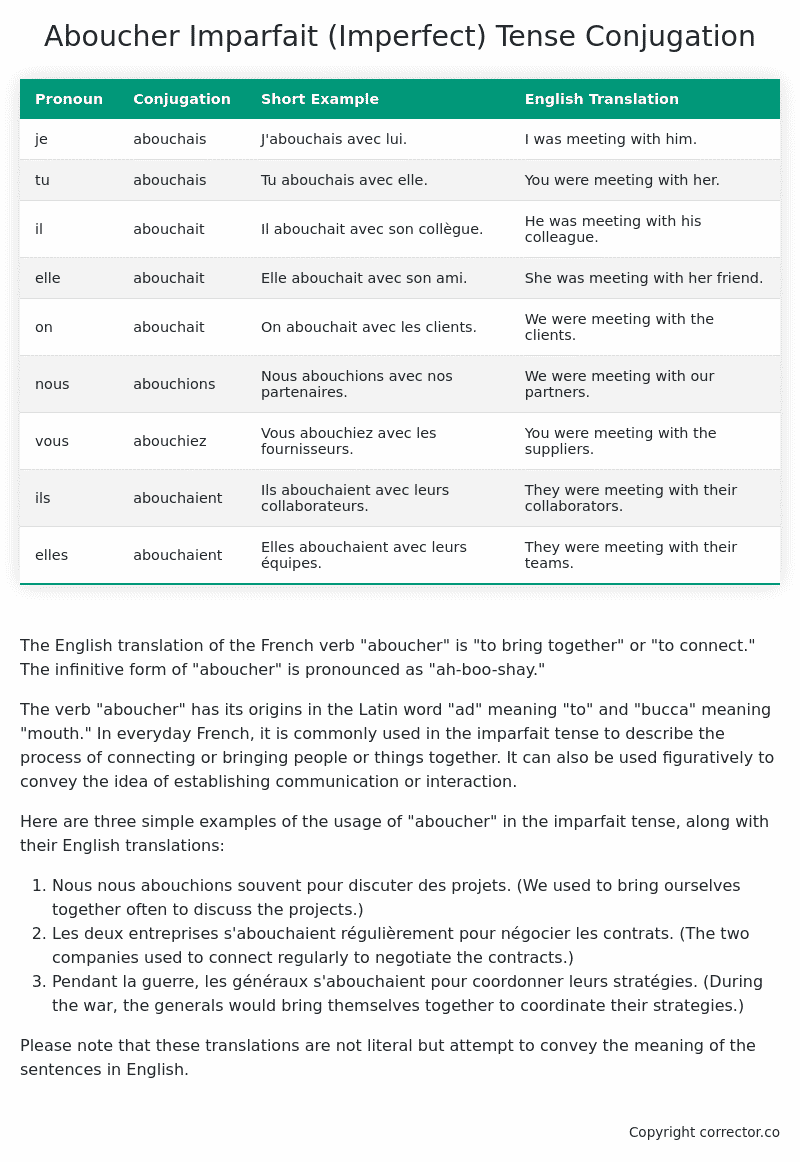Imparfait (Imperfect) Tense Conjugation of the French Verb aboucher
Introduction to the verb aboucher
The English translation of the French verb “aboucher” is “to bring together” or “to connect.” The infinitive form of “aboucher” is pronounced as “ah-boo-shay.”
The verb “aboucher” has its origins in the Latin word “ad” meaning “to” and “bucca” meaning “mouth.” In everyday French, it is commonly used in the imparfait tense to describe the process of connecting or bringing people or things together. It can also be used figuratively to convey the idea of establishing communication or interaction.
Here are three simple examples of the usage of “aboucher” in the imparfait tense, along with their English translations:
- Nous nous abouchions souvent pour discuter des projets.
(We used to bring ourselves together often to discuss the projects.) - Les deux entreprises s’abouchaient régulièrement pour négocier les contrats.
(The two companies used to connect regularly to negotiate the contracts.) - Pendant la guerre, les généraux s’abouchaient pour coordonner leurs stratégies.
(During the war, the generals would bring themselves together to coordinate their strategies.)
Please note that these translations are not literal but attempt to convey the meaning of the sentences in English.
Table of the Imparfait (Imperfect) Tense Conjugation of aboucher
| Pronoun | Conjugation | Short Example | English Translation |
|---|---|---|---|
| je | abouchais | J’abouchais avec lui. | I was meeting with him. |
| tu | abouchais | Tu abouchais avec elle. | You were meeting with her. |
| il | abouchait | Il abouchait avec son collègue. | He was meeting with his colleague. |
| elle | abouchait | Elle abouchait avec son ami. | She was meeting with her friend. |
| on | abouchait | On abouchait avec les clients. | We were meeting with the clients. |
| nous | abouchions | Nous abouchions avec nos partenaires. | We were meeting with our partners. |
| vous | abouchiez | Vous abouchiez avec les fournisseurs. | You were meeting with the suppliers. |
| ils | abouchaient | Ils abouchaient avec leurs collaborateurs. | They were meeting with their collaborators. |
| elles | abouchaient | Elles abouchaient avec leurs équipes. | They were meeting with their teams. |
Other Conjugations for Aboucher.
Le Present (Present Tense) Conjugation of the French Verb aboucher
Imparfait (Imperfect) Tense Conjugation of the French Verb aboucher (You’re reading it right now!)
Passé Simple (Simple Past) Tense Conjugation of the French Verb aboucher
Passé Composé (Present Perfect) Tense Conjugation of the French Verb aboucher
Futur Simple (Simple Future) Tense Conjugation of the French Verb aboucher
Futur Proche (Near Future) Tense Conjugation of the French Verb aboucher
Plus-que-parfait (Pluperfect) Tense Conjugation of the French Verb aboucher
Passé Antérieur (Past Anterior) Tense Conjugation of the French Verb aboucher
Futur Antérieur (Future Anterior) Tense Conjugation of the French Verb aboucher
Subjonctif Présent (Subjunctive Present) Tense Conjugation of the French Verb aboucher
Subjonctif Passé (Subjunctive Past) Tense Conjugation of the French Verb aboucher
Subjonctif Imparfait (Subjunctive Imperfect) Tense Conjugation of the French Verb aboucher
Subjonctif Plus-que-parfait (Subjunctive Pluperfect) Tense Conjugation of the French Verb aboucher
Conditionnel Présent (Conditional Present) Tense Conjugation of the French Verb aboucher
Conditionnel Passé (Conditional Past) Tense Conjugation of the French Verb aboucher
Conditionnel Passé II (Conditional Past II) Tense Conjugation of the French Verb aboucher
L’impératif Présent (Imperative Present) Tense Conjugation of the French Verb aboucher
L’impératif Passé (Imperative Past) Tense Conjugation of the French Verb aboucher
L’infinitif Présent (Infinitive Present) Tense Conjugation of the French Verb aboucher
L’infinitif Passé (Infinitive Past) Tense Conjugation of the French Verb aboucher
Le Participe Présent (Present Participle) Tense Conjugation of the French Verb aboucher
Le Participe Passé (Past Participle) Tense Conjugation of the French Verb aboucher
Struggling with French verbs or the language in general? Why not use our free French Grammar Checker – no registration required!
Get a FREE Download Study Sheet of this Conjugation 🔥
Simply right click the image below, click “save image” and get your free reference for the aboucher present tense conjugation!

Aboucher – About the French Imparfait Tense
NOTE: To take a deep dive into all the French tenses then see our article on Mastering French Tense Conjugation.
Formation of the Imparfait Tense
For regular -er verbs:
For regular -ir verbs
For regular -re verbs
Common Everyday Usage Patterns
Description of Past Habits
Background Information
Mental and Emotional States
It’s employed to express emotions, thoughts, or physical sensations in the past. For example: “J’étais content quand il est arrivé.” (I was happy when he arrived.)
Ongoing Actions
Points to Note About the Imparfait Tense
Passé Composé vs. Imparfait
Conditional
Si Clauses
Narration
I hope you enjoyed this article on the verb aboucher. Still in a learning mood? Check out another TOTALLY random French verb imparfait conjugation!


